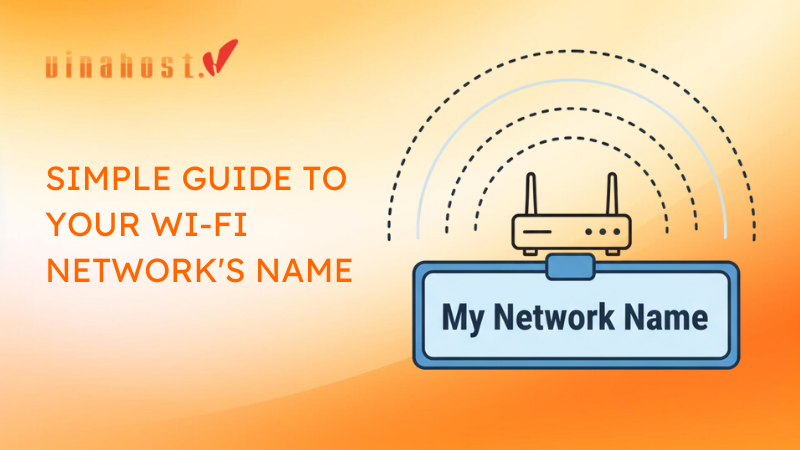When purchasing a domain name, you need to consider both the content of the domain name and its extension. The .info domain extension is one of the most popular ones currently. It is a generic top-level domain (gTLD) intended for informational websites. So, what is domain info? What are its advantages and disadvantages? Is it suitable for your website? Join us in the following article to find out more with VinaHost.
1. What is domain info?
This domain name is an abbreviation of the word “Information,” implying its use for information purposes, which is why it is often chosen by businesses, organizations, and individuals to build websites about guides, news, etc.
Additionally, the .info domain is also used in SEO strategies to build satellite systems, helping a business’s main website increase its ranking on search engines. The .info domain is a quite popular international domain in Vietnam.
A domain name is used to access a website or online service through the server’s IP address. When a user enters the domain name into a web browser, the browser sends a request to the domain server. The domain server then returns the IP address of the server hosting the website. The web browser then connects to that server to load and display the website to the user.

A domain name plays a crucial role in accessing the Internet. An easy-to-remember domain name will help users easily access your website or online service.
Also Read: What is Domain & How It Impacts Your Online Presence
2. Understanding the .info Domain Extension
2.1. A Brief History of .info
The .info top-level domain (TLD) is one of the original domains established in the early phases of the Internet, yet it wasn’t until much later that it became available for general use. Here’s a brief history of how the .info domain came into existence and evolved over time:
Introduction of .info
2000-2001: The .info domain was introduced as part of a large-scale expansion of the domain name system initiated by ICANN (the Internet Corporation for Assigned Names and Numbers), which oversees the internet’s domain name system. This expansion was intended to add variety to the limited number of top-level domains available at that time, such as .com, .org, and .net.
Launch and Adoption
The .info domain was officially launched, making it one of the first new TLDs to be approved for public use after .com, .net, and .org. The intention behind .info was to provide a dedicated space for informational sites, although it was not restricted to just informational content.
The domain opened for public registration. Unlike some TLDs that are restricted to specific groups (like .edu for educational institutions), .info was made universally available, which contributed to its quick adoption globally.
Growth and Development
- Early 2000s: As .info became widely accessible, it quickly grew in popularity among a variety of users including businesses, information portals, personal blogs, and more. It’s clear, intuitive connection to “information” made it a popular choice for informational websites.
- Ongoing: Over the years, .info has maintained a solid presence in the domain landscape. It is recognized and used worldwide, with millions of domains registered under .info. The domain is managed by Afilias, a global leader in advanced registry services, which has helped ensure its stability and reliability.
Current Status and Usage
The .info domain remains a popular choice for many types of websites that aim to disseminate information. Its use has expanded beyond just informational sites to include businesses, community groups, and personal blogs. It’s seen as a versatile domain that communicates an emphasis on providing information and resources.
The .info domain stands out as a universal, unrestricted domain that provides a credible platform for information sharing. Its broad adoption and continued relevance demonstrate its success as part of the diverse ecosystem of top-level domains available today.
Also Read: What is domain .com? | Overview of domain names .com
2.2. Who Manages .info Domains?
The .info domain is managed by Afilias, a global provider of domain registry services. Introduced in 2001, .info was one of the first new generic top-level domains (gTLD) approved by ICANN to be used on the Internet. The .info domain is intended for informative websites, though its use is not restricted and it is available to anyone who wishes to register a domain under this TLD. Afilias is responsible for the registry operations of .info, ensuring its stability, security, and administration.
3. Types of .info Domain Names Available
The .info top-level domain (TLD) is open for registration to anyone, and there are no specific restrictions on the types of domain names that can be registered under it. As such, a wide variety of domain names are available, limited only by availability and the rules set by the domain registrar you choose to register with. Here are some common types of .info domain names you might encounter:
- Generic Names: These are general terms or phrases that describe a wide range of topics or industries. For example, “business.info”, “health.info”, or “technology.info”.
- Branded Names: Companies or organizations may register their brand names under the .info domain, such as “apple.info” or “google.info”.
- Geographic Names: Names related to specific geographic locations, such as “newyork.info” or “paris.info”.
- Product or Service Names: Names related to specific products or services, such as “cars.info” or “travel.info”.
- Personal Names: Individuals might register their names or pseudonyms as .info domains for personal websites or blogs, like “johnsmith.info” or “janesblog.info”.
- Keyword Names: Names that contain specific keywords related to a particular niche or topic, such as “cookingtips.info” or “healthylifestyle.info”.
- Niche-Specific Names: Names that cater to a particular niche or community, such as “veganrecipes.info” or “gamingtips.info”.
These are just a few examples, and the possibilities for .info domain names are virtually endless. As long as the domain name you want is available and complies with the registration requirements set by the registrar, you can register it for your website or online presence.
Also Read: What is ICANN? | Why Does ICANN Matter | How It Works
4. Benefits of Using a .info Domain
- High credibility: The .info domain name has high credibility. Websites using this domain name often provide authoritative information.
- Low competition: The .info domain name is often applied to websites operating in the media field. Therefore, competition between websites will not be as intense as with other domain names.
- Increase in website traffic and natural interaction: Because they are tasked with providing useful information, customers often pay attention to websites with .info domain names. As a result, your website will increase its natural readership without having to spend money on advertising.
- Affordable price: Compared to other domain names, the .info domain name only costs a few hundred thousand. This price is quite cheap for owning a reputable international domain name.

Also Read: What is domain .net? | Overview of domain names .net
5. Who Can Register a .info Domain?
The .info domain is open for registration to anyone without any specific eligibility requirements or restrictions. Individuals, businesses, organizations, and entities from any part of the world can register a .info domain name, provided that the desired domain name is available and they comply with the registration requirements set by the domain registrar they choose to register with.
This open registration policy makes .info domains accessible to a wide range of users for various purposes, such as personal websites, business websites, informational portals, and more.
6. Choosing the Right .info Domain Name
Choosing the right .info domain name involves considering several factors to ensure it aligns with your goals and resonates with your audience. Here are some tips to help you choose the right .info domain name:
- Relevance: Select a domain name that is relevant to the content or purpose of your website. It should reflect the information you intend to provide or the message you want to convey.
- Clarity: Choose a domain name that is easy to understand and remember. Avoid using complex or obscure words, numbers, or symbols that might confuse visitors.
- Conciseness: Keep the domain name short and concise. Shorter domain names are easier to type, remember, and share.
- Keywords: Consider incorporating relevant keywords into your domain name that describe the topic or niche of your website. This can help improve search engine visibility and attract targeted traffic.
- Brandable: Aim for a domain name that is brandable and memorable. It should stand out and create a positive impression on visitors.
- Avoid Hyphens and Numbers: Hyphens and numbers can make a domain name harder to remember and type. Try to avoid them unless necessary for clarity.
- Check Availability: Before finalizing your domain name, make sure it is available for registration. Use domain search tools provided by registrars to check availability and explore alternative options if your desired name is already taken.
- Legal Considerations: Ensure that your chosen domain name does not infringe on trademarks or copyrights of existing brands or entities. Conduct a thorough search to avoid potential legal issues.
- Future Expansion: Consider the potential for future expansion or diversification of your website’s content or offerings. Choose a domain name that allows flexibility for growth and evolution.
- Personal Preference: Ultimately, choose a domain name that you personally like and feel confident about. Your domain name is an important part of your online identity, so it’s essential to select one that you’re proud to represent.
By considering these factors and conducting thorough research, you can select a .info domain name that effectively represents your website and resonates with your audience.
Also read: The Value of Domain Names: Choosing the Right Domain for Your Website
7. How to Register a .info Domain
7.1. Choosing a Domain Registrar
Choosing the right domain registrar is crucial for managing your domain effectively and ensuring a smooth online presence. Here are some factors to consider when selecting a domain registrar:
- Reputation and Reliability: Look for domain registrars with a solid reputation and track record for reliability. Research customer reviews, ratings, and industry recognition to gauge the registrar’s reliability.
- Domain Extensions: Ensure that the registrar offers the domain extension you desire, such as .info, and supports a wide range of TLDs (top-level domains) in case you wish to register additional domains in the future.
- Domain Management Tools: Evaluate the registrar’s domain management interface and tools. Look for user-friendly interfaces, intuitive control panels, and features such as domain forwarding, DNS management, and WHOIS privacy protection.
- Pricing and Renewal Fees: Compare the registrar’s pricing for domain registration, renewal, and transfer fees. Be wary of registrars offering exceptionally low introductory prices but charging significantly higher renewal fees. Consider any additional features or services included in the pricing.
- Customer Support: Assess the registrar’s customer support options and availability. Look for registrars offering multiple support channels, such as phone, email, live chat, and knowledge base resources. Prompt and knowledgeable customer support can be invaluable in resolving issues quickly.
- Security Features: Prioritize registrars that offer robust security features to protect your domain from unauthorized access, hacking, and domain hijacking. Look for features such as two-factor authentication, SSL certificates, and domain locking.
- Transparency and Policies: Review the registrar’s terms of service, privacy policy, and domain registration agreement. Ensure transparency regarding domain ownership, renewal procedures, transfer policies, and any additional fees or charges.
- Additional Services: Consider whether the registrar offers additional services such as web hosting, email hosting, website builders, and SSL certificates. Bundling domain registration with other services can streamline your online presence management.
- Transfer Process: Understand the registrar’s domain transfer process and any associated fees or restrictions. Choose a registrar that facilitates easy domain transfers and provides clear instructions and support throughout the process.
By carefully evaluating these factors, you can select a domain registrar that meets your needs, offers reliable service, and provides the necessary tools and support for managing your .info domain effectively.
Cheap Domain Registration VietNam
7.2. The Registration Process
Registering a domain name through VinaHost is a simple procedure that proceeds through several uncomplicated stages:
Step 1: Registration
Firstly, access to the domain name lookup registration page and enter the specifics of the desired domain name. Utilize the “Search” function to confirm its availability. Should the domain name be unclaimed, effortlessly add it to your cart by choosing “Registration”. Additionally, the platform facilitates the registration of multiple domain names concurrently, enhancing efficiency.
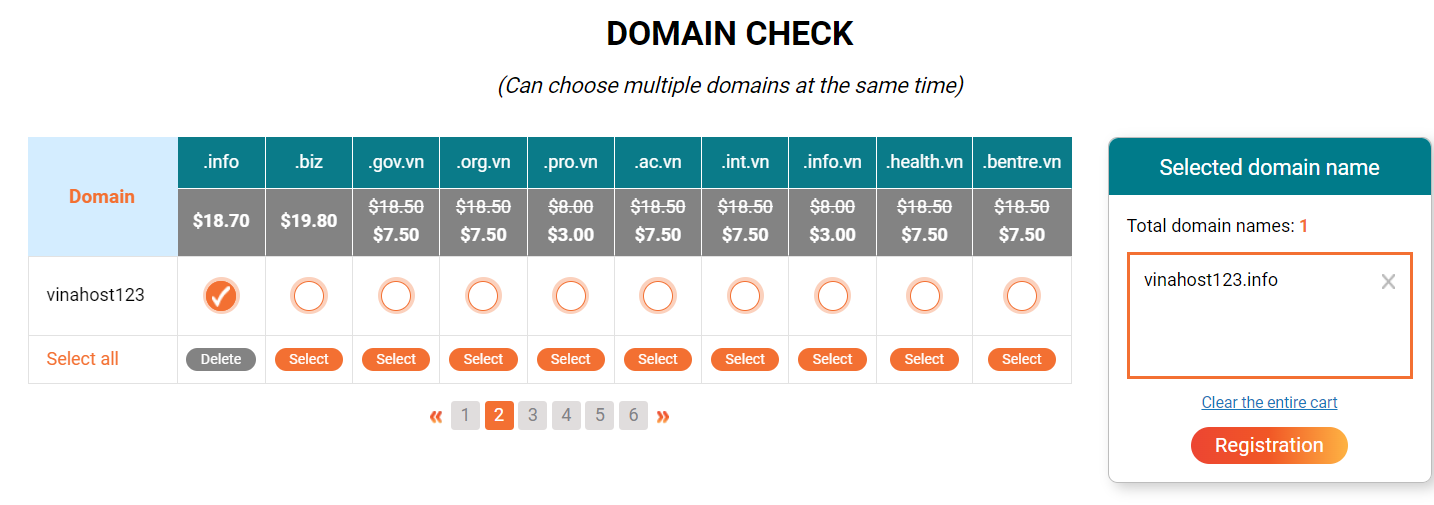
Step 2: Providing detailed information
For individuals, start by specifying the registration type as “Individual” and proceed to fill in the required information:
- Entity Name
- ID card/Passport Number
- Gender
- Date of Birth
- Full Address, following standard formatting including country, province/city, district, ward/commune, and house number, street name
- Email Address
- Phone Number
If you’re registering multiple domain names under the same entity, you can save time by entering this information once during the registration of the initial domain name. Then, for subsequent registrations, simply select “Same as…”
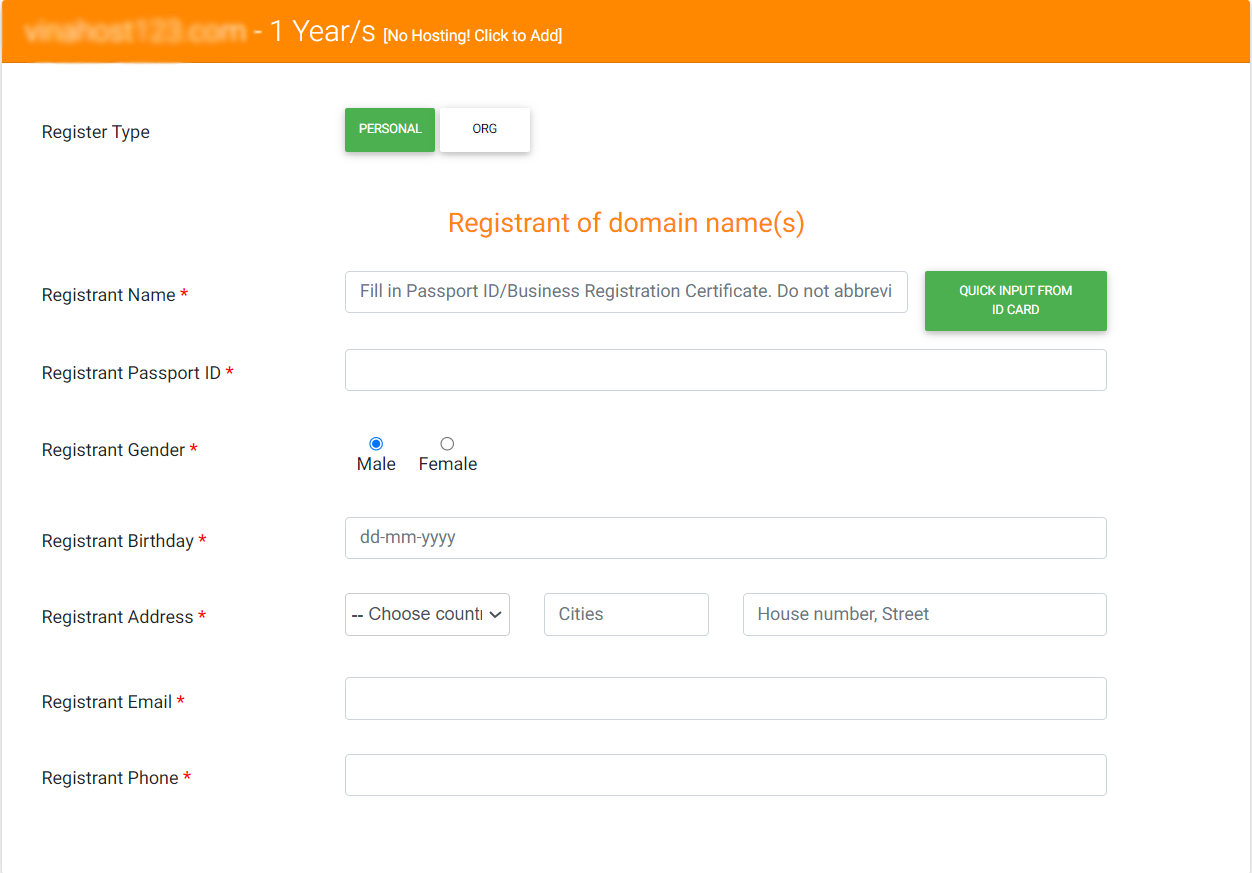
When signing up for organizations, specify the registration type as “Organization” and proceed to fill out the necessary fields with the following details:
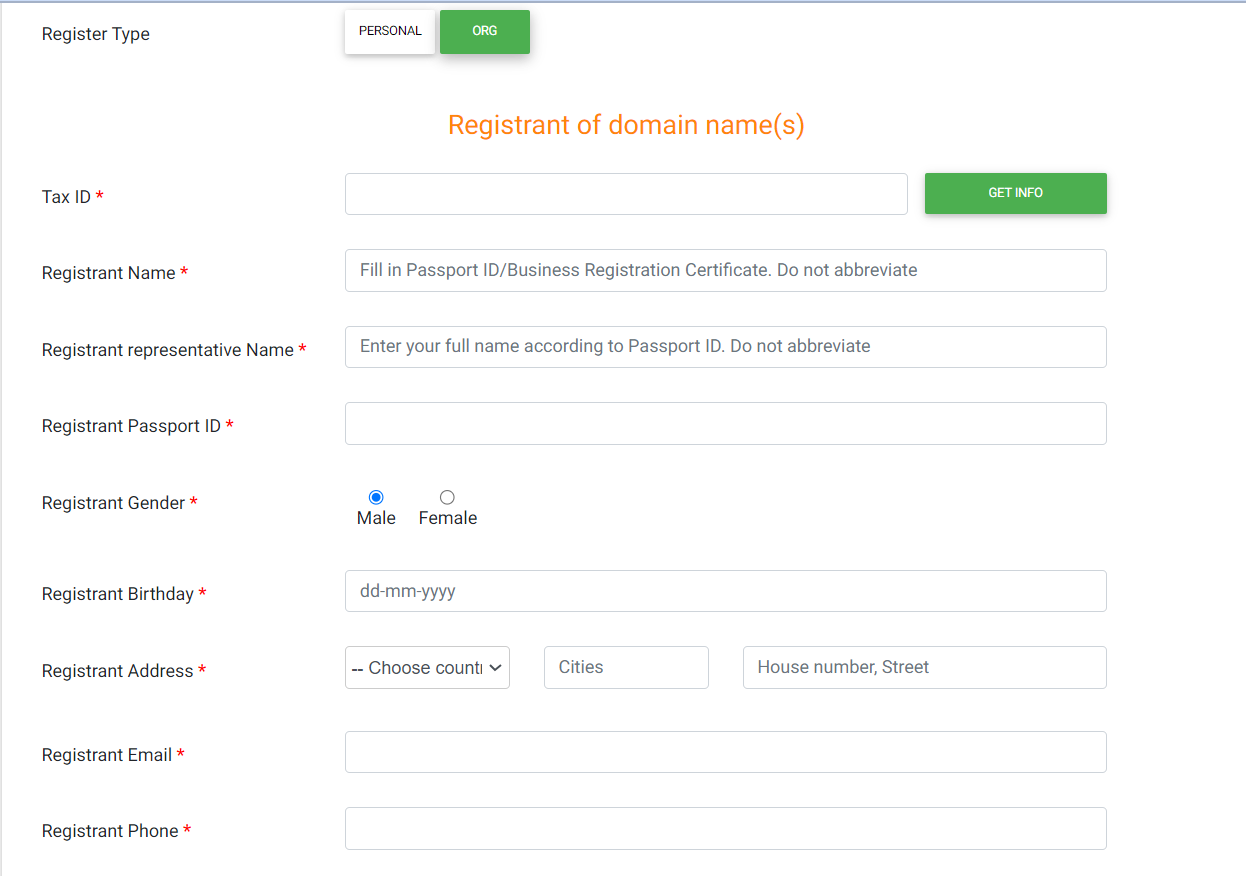
Supply further particulars such as the ID card/Passport number of the representative, choose gender, date of birth, phone number, and email.
Once all mandatory information for the Domain Registration Entity is provided, the system will automatically fill in data for the Domain Manager and the Organization Representative during the domain registration procedure. You can still adjust any details if necessary.
Step 3: Payment
Check the order details and enter any promotional code you possess.
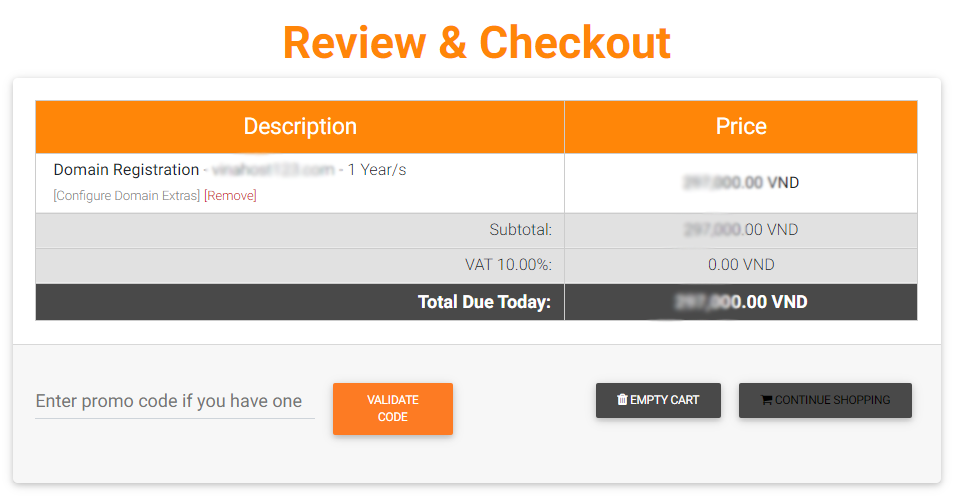
If you’re new to the service and haven’t registered an account yet, VinaHost will prompt you to provide details to create one. Necessary information includes your Full Name, Email, Phone Number, Address, Password, and a security question.
Furthermore, input details for invoice issuance, if needed, and select a suitable online payment method.
Alternatively, you can choose to make payment directly at the VinaHost Office located at Cuu Long Apartment, 351/31 No Trang Long, Ward 13, Binh Thanh District, Ho Chi Minh City (Gate B of Pham Van Dong street).
Step 4: Complete entity verification to utilize the domain name
Head to the service management page on VinaHost: https://secure.vinahost.vn/ac/clientarea.php?language=english
In the main menu, go to Verify Domain Owner. Under the Entity Verification section, you’ll see a list of domain name profiles requiring updates.
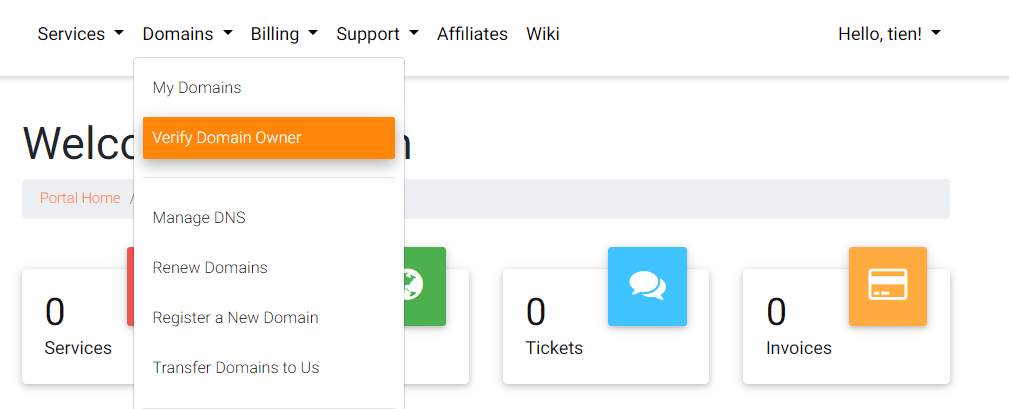
If you need further help adding information, don’t hesitate to contact VinaHost’s customer care team.
Contact Information:
- Email: support@vinahost.vn
- Hotline: 1900 6046
- Livechat: https://livechat.vinahost.vn/chat.php
Please be aware that VinaHost conducts checks and verifies domain name profiles during administrative working hours.
8. The Future of .info Domains
Predicting the exact future of .info domains involves considering various factors, including technological advancements, industry trends, and regulatory changes. However, we can make some informed speculations based on current observations and developments:
- Continued Relevance: .info domains are likely to remain relevant as a trusted choice for informational websites. With the growing importance of online information and content consumption, there will likely continue to be a demand for domains that signify reliability and credibility.
- Competition from New TLDs: The landscape of domain extensions continues to evolve with the introduction of new generic top-level domains (gTLDs). While this may increase competition, .info domains could maintain their niche as a go-to option for informative content due to their established reputation.
- Integration with Emerging Technologies: As technologies such as artificial intelligence, augmented reality, and blockchain continue to advance, .info domains may find new applications and integrations. For example, they could be used for informational resources in emerging tech sectors or as part of decentralized web projects.
- Global Expansion: The internet’s reach continues to expand, particularly in regions with growing internet penetration rates. .info domains could play a role in providing accessible and informative content to diverse audiences worldwide, including multilingual and culturally diverse content.
- Enhanced Security and Trust: With increasing concerns about online security and trustworthiness, .info domains may prioritize implementing advanced security measures to protect against cyber threats and bolster user confidence in the reliability of informational websites.
- Adaptation to SEO Trends: Search engine optimization (SEO) practices are constantly evolving, and .info domain owners may need to adapt their strategies to align with changing SEO trends and algorithms. This could involve optimizing content, improving site speed and mobile-friendliness, and enhancing user experience to maintain visibility in search engine results.
- Regulatory Changes: Changes in internet governance, regulations, or policies could impact the registration, management, and use of .info domains. Domain registrars and owners may need to stay informed about regulatory developments and compliance requirements to ensure continuity and adherence to relevant regulations.
While the future of .info domains may involve challenges and changes, they are likely to continue serving as valuable assets for informational websites and contribute to the diverse landscape of the internet.
Also Read: What is Transfer Domain? & How to Transfer a Domain?
9. FAQs
9.1. Is domain info private?
The privacy of domain registration information, often referred to as WHOIS privacy, depends on the domain registrar and the domain privacy services they offer.
By default, domain registration information, including the registrant’s name, email address, phone number, and physical address, is publicly accessible through the WHOIS database. This information is required to be provided by domain registrants and is used for various purposes, including verifying domain ownership, contacting domain owners, and enforcing legal responsibilities.
However, many domain registrars offer WHOIS privacy protection services, also known as domain privacy or WHOIS masking, as an optional add-on. When you enable WHOIS privacy protection for your domain, the registrar replaces your personal contact information with the contact details of a privacy service provider. This helps to shield your personal information from public view while still complying with domain registration requirements.
It’s important to note that WHOIS privacy protection services may vary in terms of features, pricing, and effectiveness. Some registrars may include WHOIS privacy protection as part of their domain registration packages, while others may offer it as an additional paid service.
If privacy is a concern for you, it’s recommended to research domain registrars and their privacy offerings carefully before registering a domain. Additionally, familiarize yourself with the privacy policies and terms of service of both the registrar and the privacy service provider to understand how your personal information will be handled and protected.
9.2. How much does domain .info cost?
The cost of a .info domain can vary depending on the domain registrar you choose and any promotions or discounts they may offer. Typically, the price for a .info domain registration ranges from around $10 to $20 per year. Some registrars might offer bulk discounts or special deals for the first year of registration. It’s a good idea to compare prices from different registrars to find the best deal for your needs.

9.3. Are there any restrictions on using an .info domain?
There aren’t any specific restrictions on who can register a .info domain or how it can be used. However, like with any domain extension, there are general policies and guidelines that apply. For example:
- Trademark infringement: You can’t register a .info domain that infringes on someone else’s trademark.
- Illegal activities: You can’t use a .info domain for illegal purposes such as phishing, fraud, or distributing malware.
- Spamming: Using a .info domain for spamming purposes is not allowed.
- ICANN policies: Registrants must comply with ICANN’s policies and regulations governing domain registrations.
It’s always a good idea to check with the specific registrar you’re considering to see if there are any additional terms or restrictions they impose on .info domain registrations. Additionally, be sure to abide by the laws and regulations of the country where you operate, as they may have their own rules regarding domain usage.
9.4. Is “.info” a less reputable domain extension compared to “.com”?
Historically, “.com” has been the most popular and widely recognized domain extension, often associated with commercial or business websites. As a result, it may be perceived as more reputable or trustworthy by some users simply due to its familiarity and widespread usage.
On the other hand, “.info” was originally intended for informational websites, but it has been used for a variety of purposes over time. While it may not carry the same level of recognition or prestige as “.com” for some users, it doesn’t necessarily mean that it’s less reputable. Many reputable websites and organizations use .info domains effectively.
Ultimately, the reputation of a website is not solely determined by its domain extension. Factors such as the content, design, security, and credibility of the website itself play a significant role in how it is perceived by users. If a website provides valuable and trustworthy information or services, users are likely to perceive it positively regardless of the domain extension.
Also Read: What is domain .com.vn? | Overview of domain names .com.vn
10. Conclusion
For example, with the domain name “.info”, customers will understand that the website primarily focuses on information dissemination and communication. This type of domain name is often of interest to users who intend to build websites for informational guides and services.
By now, hopefully, you understand “what is domain .info?”. If you are seeking a unique and memorable domain name for your business, then a .info domain name could be a good choice. If you have any questions that need clarification, please don’t hesitate to contact us.
- Email: support@vinahost.vn
- Hotline: 1900 604
- Livechat: https://livechat.vinahost.vn/chat.php
You can also check out other interesting articles HERE to stay updated with new knowledge every day.
What is Addon Domain – A Gateway to Website Expansion
What is a Subdomain? Exploring the Difference Between Domains & Subdomains


 Tiếng Việt
Tiếng Việt English
English 简体中文
简体中文



















































































